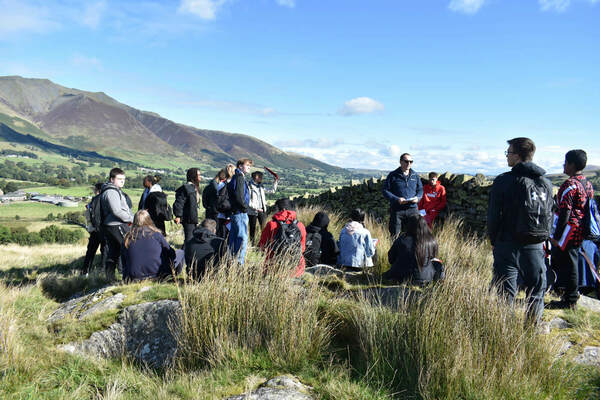Course overview
Our amazing world is explored throughout this course; from human populations to the impact of global warming; from destructive natural hazards to man-made future challenges. Geography examines the environment around us, how it affects us and most importantly, how we can live on our planet in a sustainable way.

Entry requirements
Students studying three A Levels and/or AAQs will be expected to have a minimum of two GCSEs at grade 5 and three at grade 4, including English Language and Mathematics.
Students studying four A Levels will be expected to have a minimum of six GCSEs at grade 7, 8 or 9 including English Language and Mathematics at grade 6 or above.
Topics you will study
Year 1
• Tectonic processes and hazards
• Coastal processes and management
• Globalisation
• Regeneration
Year 2
• Water insecurity
• Energy security
• Superpowers
• Migration and Identity
Key features
First year: A varied and interesting introduction that has a balance of human and physical geography which also explores the links between the two disciplines. Key topic areas covered include dynamic landscapes; how our local and global landscapes are shaped and changed by tectonic processes, hazards and coastal processes and landscapes. Human topics consider the increasing globalisation and global interdependence of business and people and the resulting inequalities. Linked to this is the regeneration of local places and the associated economic and social change. All topics are underpinned by fieldwork and the study of local, national and international case studies. Students collect data for their personal studies and progression into their second year.
Second year: Developing some of the content from the first year one to examine key themes and what this means for global solutions and our future world. Three key themes are the ‘players’ involved in decision making, attitudes and actions, and futures and uncertainty. These themes offer excellent opportunities to delve deeper into topics and debate key issues and solutions. There is also an individual investigation to complete on a topic area of your choice. This is based around fieldwork and research followed by independent analysis and evaluation of data and extended writing. The investigation accounts for 20% of the overall A Level qualification and will be completed in the second year.
The course requires students to undertake a minimum of five days compulsory field work which may be conducted as single day visits or residential trips. The cost of field trips are met by The Sixth Form.
Assessment
The assessments will comprise of three final examinations:
Paper 1 (Physical) – covers Hazards, Coasts and Water/Energy
Paper 2 (Human) – covers Globalisation, Superpowers, Regeneration and Migration.
Paper 3 - is a synoptic assessment with a variety of styles of questions, ranging from short data-linked analysis questions to extended evaluative essays.
Exam Board: EDEXCEL
Enrichment and Work Experience
The geography course has a compulsory fieldwork element. The fieldwork includes a variety of exciting destinations, including a two-day fieldtrip to The Holderness Coast to see amazing beaches, cliffs and processes in action. The students will learn first-hand about the environment and processes that have been taught in the classroom. In addition to this, there are one-day fieldtrips to urban destinations such as Manchester and Blackpool to study aspects of regeneration. Dates of all trips will be provided at the start of the course. Previous students have secured work placements with relevant organisations such as local councils, The Environment Agency and environmental consultancy businesses. Students have the opportunity to attend relevant conferences, and we regularly have visits from and trips to local employers, universities, and past students.
Students have the opportunity to complete a one-week work placement or live-brief in the Summer term.
Why choose B6?
Geography is a brilliant subject that is very varied and constantly changing. The course is lively, engaging and full of interesting topics. Our students have performed very well in this subject and many have decided to continue their geography studies at university.
Future career opportunities
Geography graduates are amongst the most employable, as the subject is a combination of the facts of science and the understanding of the arts, that equip you with a range of highly sought after skills. Many students progress to university and careers such as environmental science, marine biology, engineering, travel and tourism and environmental management.
Additional information
The Sixth Form will cover costs of fieldtrips including: transport, accommodation, breakfast and evening meals. Some personal spending money for anything additional is recommended.
Victoria Ukpong
Studying:
A Level Biology, Chemistry, Physics, AS Level Core Mathematics and EPQ
Previous school:
Dean Trust Rose Bridge Academy
Related Courses
News
Three B6 Students Delighted to Run as Youth MP Candidates
Three B6 students were delighted to share with us that they are running as candidates to become a Youth Member of Parliament (MP).
Future Lawyers Celebrate Exceptional Results
Students from The Sixth Form Bolton are celebrating securing their first-choice universities and
A Level Law Students Participate in Criminal Justice Workshop at Bolton Coroners’ Court
A Level Law Students Participate in Criminal Justice Workshop at Bolton Coroners’ Court A Level









